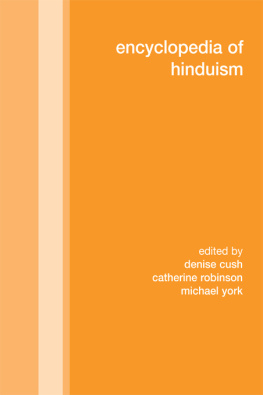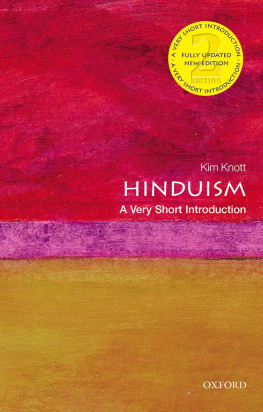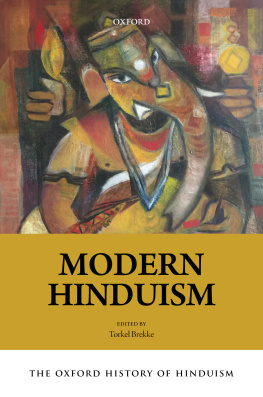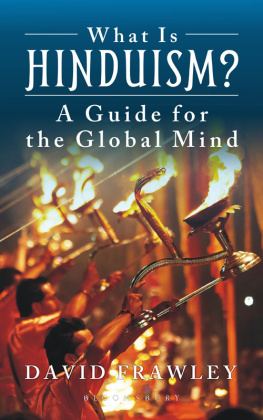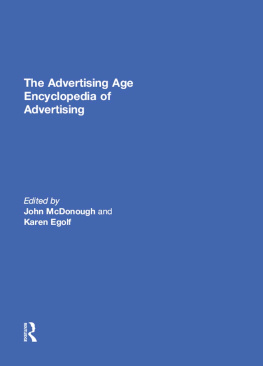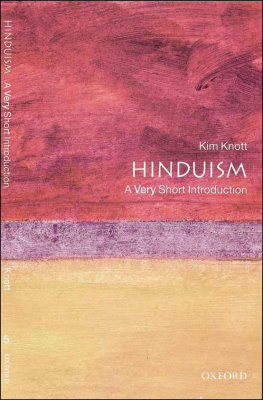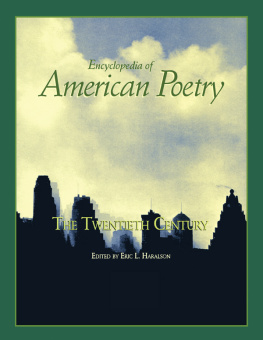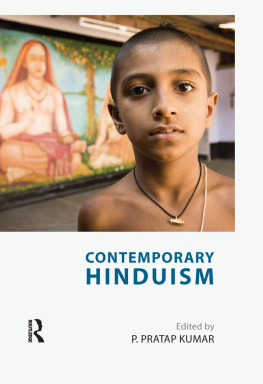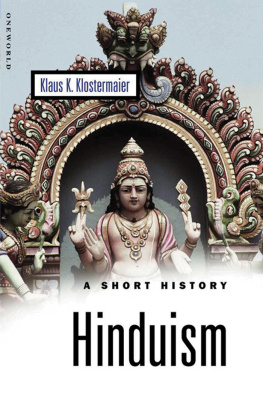
Encyclopedia of Hinduism
Encyclopedia of Hinduism
Edited by
Denise Cush
Catherine Robinson
Michael York

First published 2008
by Routledge
2 Park Square, Milton Park, Abingdon, OX14 4RN
www.routledge.co.uk
Simultaneously published in the USA and Canada
by Routledge
270 Madison Avenue, New York, NY 10016
www.routledge.com
Routledge is an imprint of the Taylor and Francis Group, an informa business
2008 Editorial matter Denise Cush, Catherine Robinson, and Michael York
Contribution 2008 The Authors
Typeset in Times New Roman and Optima by
Taylor & Francis Books
Printed and bound in Great Britain by
TJ International Ltd, Padstow, Cornwall
All rights reserved. No part of this book may be reprinted or reproduced or utilized in any form or by any electronic, mechanical, or other means, now known or hereafter invented, including photocopying and recording, or in any information storage or retrieval system, without permission in writing from the publishers.
British Library Cataloguing in Publication Data
A catalogue record for this book is available from the British Library
Library of Congress Cataloging-in-Publication Data
A catalog record for this book has been requested
ISBN13: 978-0-7007-1267-0
To all scholars and students of Hinduism, past, present and future
Advisory board
John Brockington
University of Edinburgh
Wendy Doniger
University of Chicago
Dermot Killingley
University of Newcastle
Kim Knott
University of Leeds
Arvind Sharma
McGill University
Preface
The Ninth Edition of The Encyclopaedia Britannica of 1878 has no entry for Hinduism per se but rather one for Brahmanism presented as the term commonly used to denote a system of religious institutions originated and elaborated by the Brahmans, the sacerdotal and, from an early period, the dominant caste of the Hindu community. In our day and age, Richard Gombrich has complained that the term Hinduism is an artificial superimposition instituted by Western scholars onto the multifarious and divergent traditions of the Indian subcontinent. Hindus themselves often refer to their tradition as the santana-dharma or the eternal law. It was, however, the Persians who first coined the term Hindu to designate the inhabitants of northern India in and beyond the Sindhu (Indus) river basin. In time, the term was adopted by the people of the subcontinent who identified with its dominant religious tradition.
For better or for worse, Hinduism has come to be the accepted term designating the religion that traces its origins to the Veda dating from the second millennium B.C.E. The present Encyclopedia of Hinduism, edited by Denise Cush and Catherine Robinson of the Study of Religions Department, Bath Spa University, with Lynn Foulston at University of Wales, Newport, represents a considerable accomplishment that encompasses the diverse and endlessly fascinating multitude of traditions, sects and practices that are today approached both within India and beyond as Hinduism. With its overwhelming complexity of both practice and textual tradition, Hinduism is certainly one of the more interesting of the worlds religions. In many respects, it is as much a behavioural activity as it is a definable religion. It both tantalises through inconsistency and fascinates with its confident reach toward the ineffable.
Contributors to this volume include both leading authorities and emerging scholars in this field. Their expertise enables the reader to gain insights into the rich heritage and contemporary vitality of Hinduism which has so much to offer academically but also in terms of inspiring answers to fundamental questions about the meaning and purpose of life.
Michael York
Introduction
There is a challenge in producing an encyclopedia of Hinduism when the editors, many of the contributors, and scholarly debate in general are not sure that such a thing as Hinduism really exists or that an encyclopedia can do justice to the fluidity, diversity, and complexity of the beliefs and practices so designated. The issues surrounding Hinduism both as a term and as a concept are legion. Scholars have devoted a great deal of time and energy to critical examination of the meaning and implications of Hinduism as well as to its origins and provenance. Debate has focused on whether Hinduism is a helpful category of analysis or whether it lends itself to a reified view of a bounded entity. Similarly, opinions differ as to the status of Hinduism in terms of its genesis either from within the subcontinent as an organic development or alternatively from the West as an exogenous construct imposed upon indigenous beliefs and practices. Another controversy centres on the unity and multiplicity of Hinduism with arguments ranging from those advocating an essence to Hinduism (though, of course, disagreeing as to what that essence might be) to those who argue that Hinduism is best used as an umbrella term covering a wide variety of traditions or even discrete religions. For some Hinduism is timeless, for others it is ancient, but there are many others for whom Hinduism is a product of encounter with Islam or later colonial rule. Such a short summary does not convey the strength and subtlety of the numerous books and articles that have been written on this subject. It does, however, give some insight into the contested nature of Hinduism and the challenge inherent in any attempt to represent it fully and fairly.
Inevitably, there are sensitivities when scholars trespass upon sacred ground. That said, among the contributors to this work are not only leading researchers but practising Hindus. Of course, Hindus themselves adopt a variety of positions on the role of academic study of their traditions, especially where such study calls into question certain cherished truths. The editors have attempted to ensure that the Encyclopedia of Hinduism offers a balanced treatment that enables the reader to encounter a range of views and decide for him/herself on their merits. If, in spite of their efforts, members of the faith community find some of the opinions expressed unacceptable, the editors apologise for any offence taken though they remain committed to academic values and their application to the study of such a rich and enriching religion.
The last few years have seen some valuable new reference works for the study of Hinduism, often containing series of substantial essays on key topics and themes and incorporating the insights of an impressive array of scholars. This encyclopedia differs in terms of its structure and design from the format of these reference works because it can easily be consulted to discover basic facts as well as providing extended discussions of major subjects. The reader will find in this encyclopedia a comprehensive coverage of many different aspects of Hinduism and related areas. These provide the reader with an introductory overview. Where appropriate, entries focus on contemporary relevance and, especially in longer entries, indicate points of scholarly disagreement and debate. Both Hinduism and its study continue to change and readers are encouraged to use this work as a foundation for and guide to ongoing exploration of the subject.
Scope and purpose
This encyclopedia combines an accessible style suited to a primarily undergraduate readership with a depth of scholarship that encompasses recent debates and discoveries. Without conceding some of the more standard material that any encyclopedia aimed at this audience needs to contain, the
Next page
